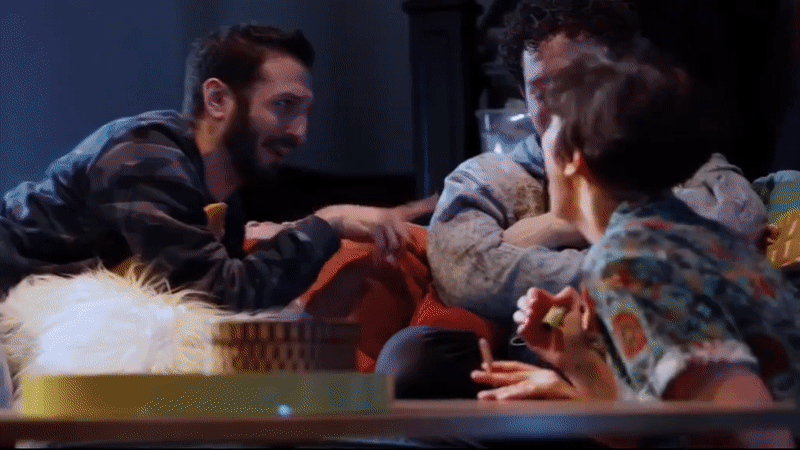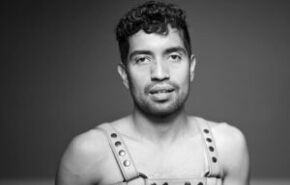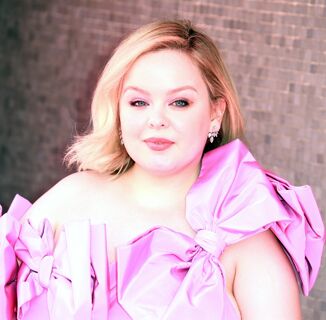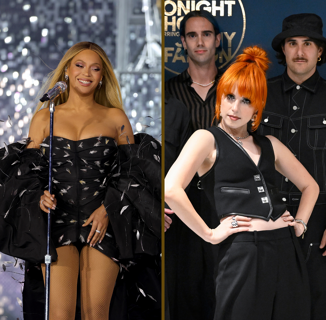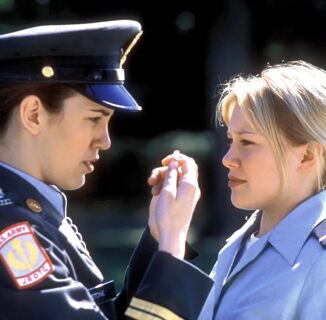In 2003 — the year in which playwright Martin Yousif Zebari’s Layalina’s first act takes place — queer representation onstage often lacked diversity. While Tony Kushner and Terrence McNally rightfully became theatrical giants, their stories recurrently centered white, cis gay men suffering through the AIDS epidemic (Angels in America) or struggling to the point of murdering their ex-lovers (The Lisbon Traviata). Gender and cultural identities, and family stories that weren’t extremely specific either didn’t play a part or were a supporting narrative.
Twenty years later, queer rep in theater is far more intersectional. (Recent examples include Victor I. Cazares’s multimedia immigrant tale american (tele)visions and JC Lee’s queer friendship story To My Girls.) Though there is always work to do, the world premiere of Layalina at Chicago’s Goodman Theatre is a significant and beautiful step forward. Zebari’s story of an Iraqi/Assyrian family’s journey toward home is proudly queer, and the topic of identity is an integral part. Layalina (an Arabic term meaning “our nights”) begins when newlyweds Layal (Becca Khalil) and Sahir (Waseem Alzer) prepare to emigrate from Baghdad, Iraq, to Skokie, Illinois, where Sahir’s family is waiting to welcome them. Layal’s family, however, is having issues getting out: her father Yasir (Mattico David) has a government job, and her beloved brother Mazin (Ali Louis Bourzgui) is facing a mandatory stint in the military. Just as the family reaches a temporary solution, tragedy strikes.

Fast-forward to 2020, when Layal (Atra Asdou) prepares to welcome Mazin (David), now living in Australia with his wife and children, for a visit to the Skokie home she shares with the younger siblings she’s raised since they left Iraq. Now in their early twenties, siblings Marwa (Khalil) and Yousif (Bourzgui) are out and proud activists, much to Yousif’s shock. When the pandemic forces all to shelter in place, cultures clash, secrets are revealed, and the just-reunited family reckons with who they were, are, and may become.
Related:
Victor I. Cazares on Queering Theater, One Retro Video Game at a Time
“The act of writing is not to make things easier… it’s to create something from which something else can launch,” says ‘american (tele)visions’ playwright Victor I. Cazares.
Los Angeles-based playwright Zebari began Layalina during the COVID-19 lockdown. The play received two workshops, a staged reading in New York City, and a slot in the Goodman’s 2021 New Stages Festival before this month’s fully staged world premiere, directed by Sivan Battat. For Zebari, who was born in Iraq and came to the United States as a child, Layalina is both a reaction to the one-dimensional roles they were cast in as an actor and the lack of stories that intersect queer and SWANA (South West Asian and North African) identities, as well as a love letter to SWANA families.
“I’m drawn to family stories,” Zebari told The Reader in 2021. “I’m drawn to how a family operates and how a family hurts each other while they love each other. And I find that to be very true, especially in SWANA culture.”
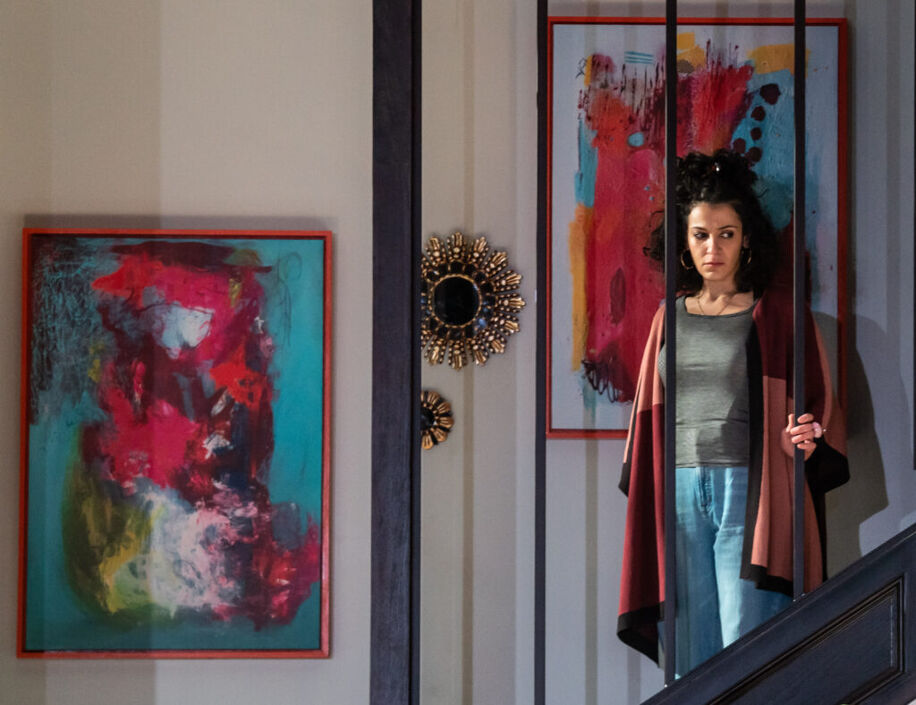
Spanning 17 years and two continents, with five actors playing the multigenerational family, Layalina deftly explores SWANA, American, and queer identities and how the three come together — starting with Layal’s brother, Mazin.
From the joyful Act One opening, in the moments after Layal and Sahir’s nuptials, it’s clear Mazin is struggling. He liked dressing up in his sister’s clothes as a child and now wants to spend more time with his brother-in-law Sahir, going to protests and having midnight heart-to-hearts. Though Sahir doesn’t return the kiss Mazin unexpectedly bestows, the two remain close — but when Mazin must choose between military service and “getting to know” a young Iraqi woman now living in Australia, it’s clear that what he really wants is impossible in this frightening political climate, amid his father’s pressure to “be a man.”
In Layalina’s second act, Mazin’s choice is revealed: marriage, children, and putting his long-ago crush far behind. Though Mazin and his family live in Australia, he’s internalized the masculine mandates imposed on him as a young person in Iraq. Imagine his shock at the siblings he last saw as small children: out as gay and nonbinary, respectively, toking on vapes and protesting on behalf of Black Lives Matter, along with Sahir’s queer younger brother Amin (Alzer), while older sister Layal looks on with supportive bemusement. Of course, everything is more complex than it first appears, as Mazin will soon find out once his flight home is grounded indefinitely, and what began as a two-week visit stretches into three months.
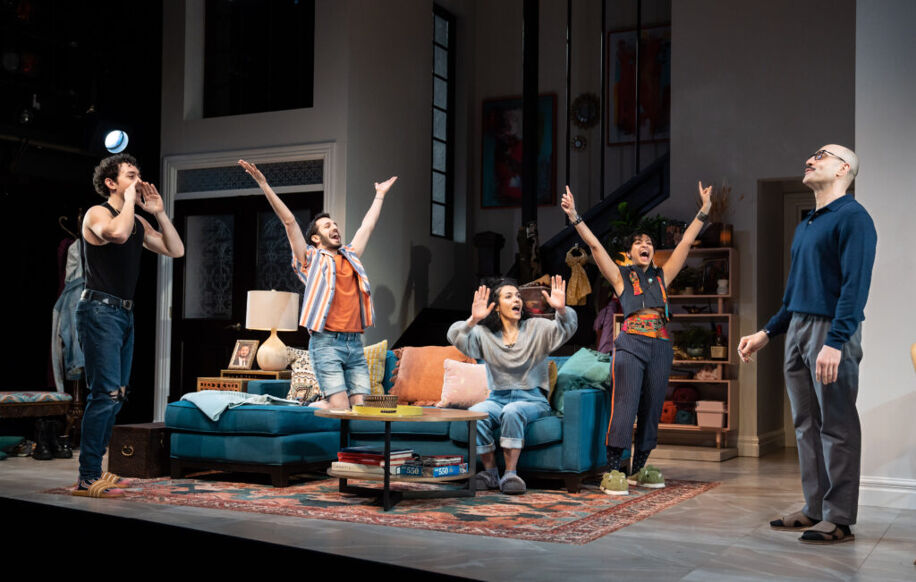
Like many family stories, Layalina is full of tragedy and trauma but equal parts humor and joy. At the core of the Ibrahims is a deep love that transcends all differences. Rather than a pat sitcom ending, the play’s resolutions are full of hope: four reunited siblings cuddled together on the sofa, watching old home movies; a straight-edge individual taking his first inhale of pot to joyous cries; dinner-table selfies and sweet first kisses. Every character, not just Mazin, learns and grows — like Layal confides to her brother, understanding begins with engagement.
Layalina is the rare play that’s both culturally specific and heart-wrenchingly universal, a queer intersectional triumph executed in authentic voices throughout. More of these stories, please. ♦
Layalina plays through April 2 and Chicago’s Goodman Theatre.
Related:
Sis is Cementing Herself As One of Theater’s Greatest Up and Coming Stars
“If you’re going to do something, you need to do it well, and if you’re going to do something, you need to pull out every stop, and you need to be the baddest bitch to do it”
Help make sure LGBTQ+ stories are being told...
We can't rely on mainstream media to tell our stories. That's why we don't lock our articles behind a paywall. Will you support our mission with a contribution today?
Cancel anytime · Proudly LGBTQ+ owned and operated
Read More in Entertainment
The Latest on INTO
Subscribe to get a twice-weekly dose of queer news, updates, and insights from the INTO team.
in Your Inbox

